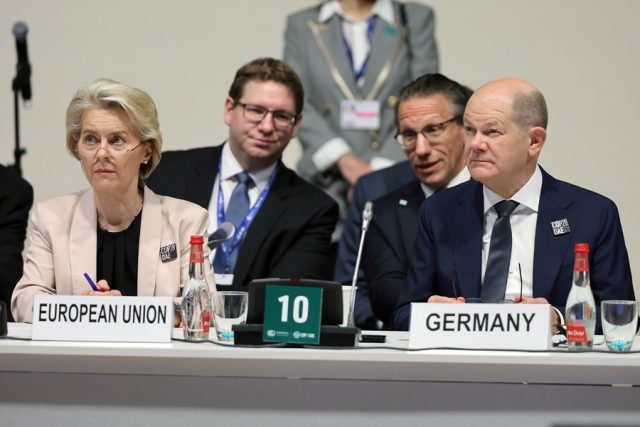
On 28 November, Alessandro Imperiali informed the readers of The Conservative about COP28, the 28th United Nations Conference on Climate Change having taken place in Dubai, United Arab Emirates, from 30 November to 12 December. He recalled that the EU should stop blaming itself and be hard on non-EU players. He reminded that it is mainly third countries, in particular Asian and developing nations, which are more responsible for global pollution and environmental problems.
Already at their meeting in Kilkenny from 3 to 5 November, the ECR Party members had warned that environmental policy must avoid useless slogans and implement instead measures based on a cost/benefit analysis to ensure proportionality and relevance.
From 8 to 12 December, a European Parliament delegation travelled to Dubai in order to participate in the conference. As a mandate, the European Union co-legislator had previously approved a resolution by which it supports a global target for tripling renewable energy and doubling energy efficiency by 2030.
From the 67 members of the European Parliament belonging to the ECR Group, none had voted in favour of the resolution, with a vast majority of 59 voting against and only four (Bourgeois, Jurzyca, Kanko and Van Overtveldt) abstaining.
During the debate in plenary, Grzegorz Tobiszowski from Poland had stated that the Chinese are increasing their amount of coal-based energy and coal mining. Johan Nissinen of Sweden also warned about “climate villains like China and India”, whom the EU subsidises by buying their solar, wind and battery products.
On 8 December, in the joint press conference held with delegation Chair Peter Liese (European People’s Party) and Climate Action Commissioner Wopke Hoekstra, the latter made such dubious statements as that the EU stands “united” in the approach towards COP28 and that the environmental targets assumed by the EU are “demanded by scientists”.
On 14 December, Maicol Pizzicotti Busilacchi has pointed out that the choice of Dubai was polemic in the first place, as the United Arab Emirates is among the main producers of oil, one of the fossil sources considered a cause of the so-called climate change.
On the same date, ECR Member of the European Parliament Teuvo Hakkarainen concluded that “there is a distinct hypocrisy in the COP28; we need to give ourselves more time to reduce our consumption of fossil fuels, because the technological solutions just are not abundant enough yet”.
Perhaps the hypocrisy arises also from the fact that the conference president, Sultan Al Jaber, is none other but the CEO of the Abu Dhabi National Oil Company (ADNOC) – a rather clear practical example of a conflict of interest.
ADNOC executives were said to read COP28 emails, as both organisations could access the same email servers. The conference was even used to negotiate oil deals between more than 20 different nations, while anti-fossil fuel international agreements were aimed at being achieved on a global level.
For instance, McKinsey was reportedly using its position as primary advisor to COP28 hosts apparently to push the interest of its oil and gas clients ExxonMobil and Aramco. Among the nations present at COP28 and at the same time negotiating oil agreements with the hosting country were the United Kingdom, France, and Germany.
Some oil millionaires were supporting COP28, such as the Belarusian oligarch Andrei Melnichenko, a close ally of Vladimir Putin and chair of Russia’s committee on climate policy and carbon regulation, whose foundation is considered a “climate supporter” on the official COP28 website.
The Kazakh billionaire delegate, Timur Turlov, who has been accused of helping Russian oligarchs evade sanctions through his financial firm, has been speaking on a conference panel about reducing the carbon footprint and attracting “green investments”.
Source of image: Efe



 Subscribe
Subscribe